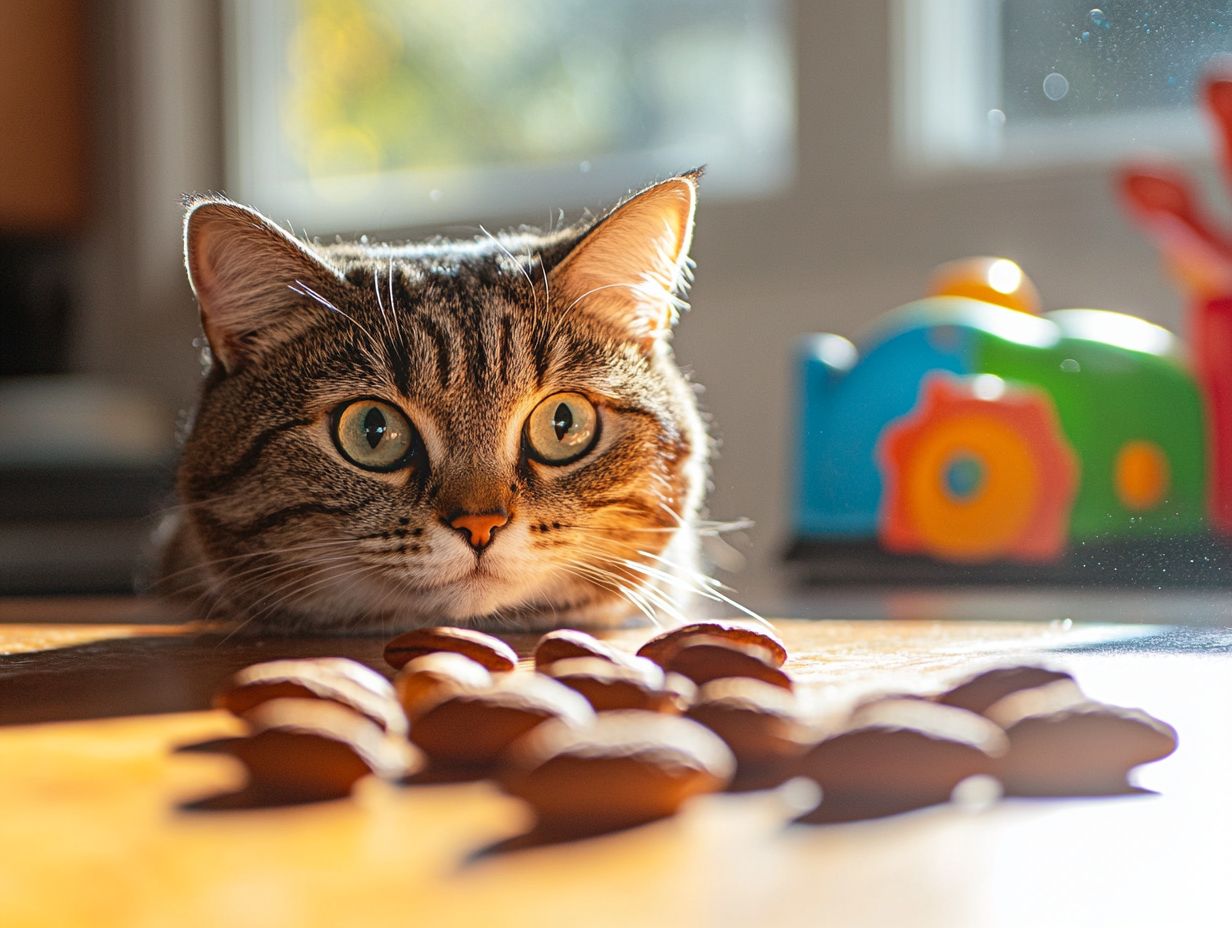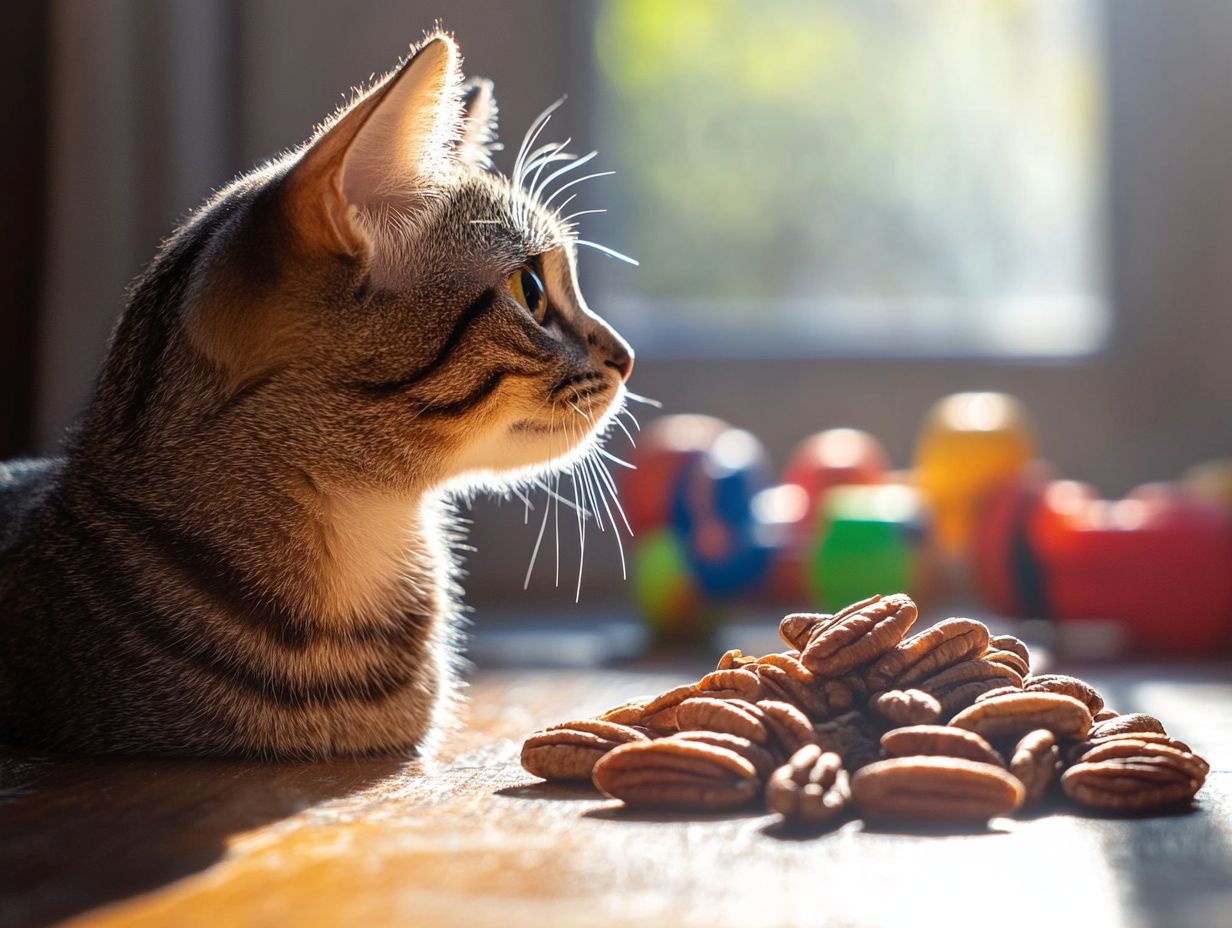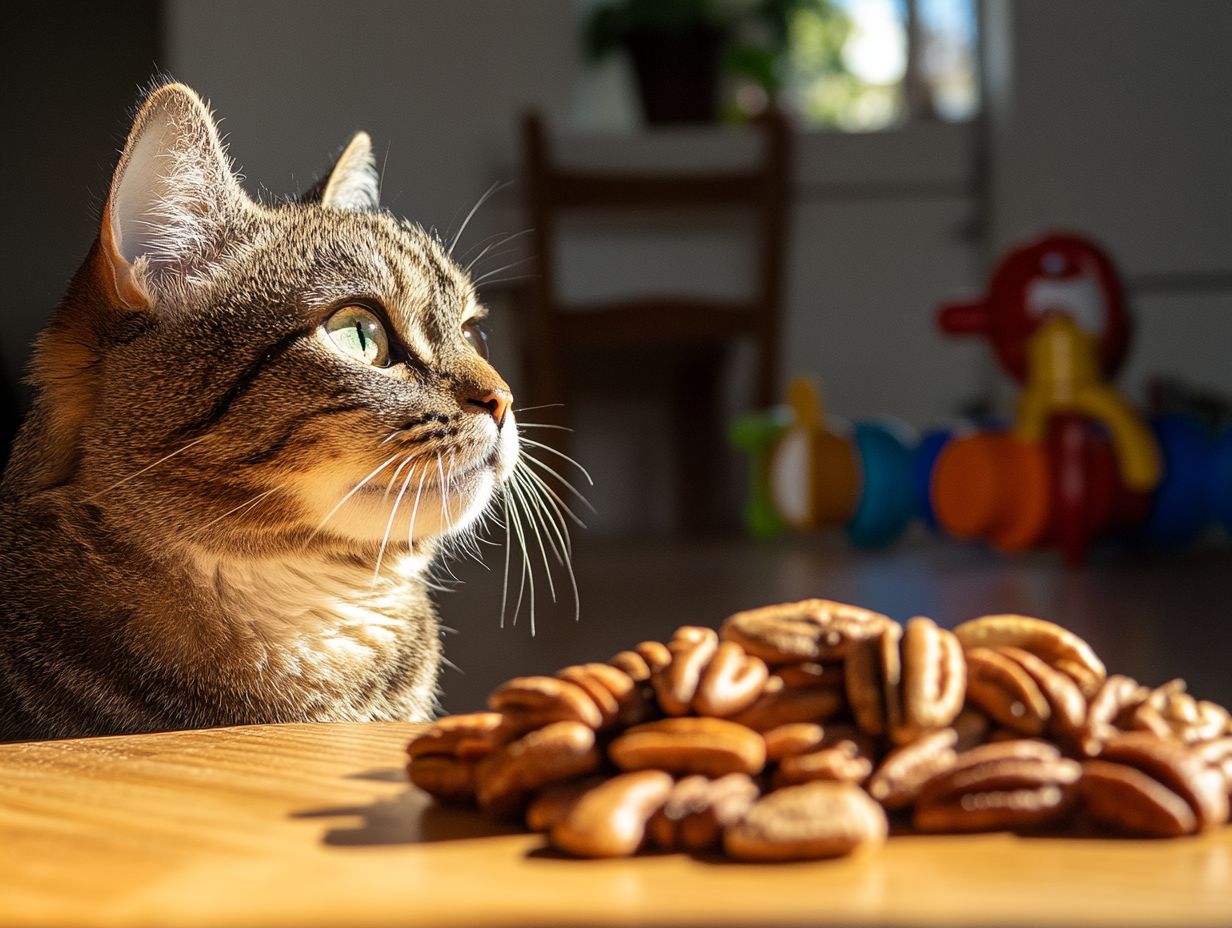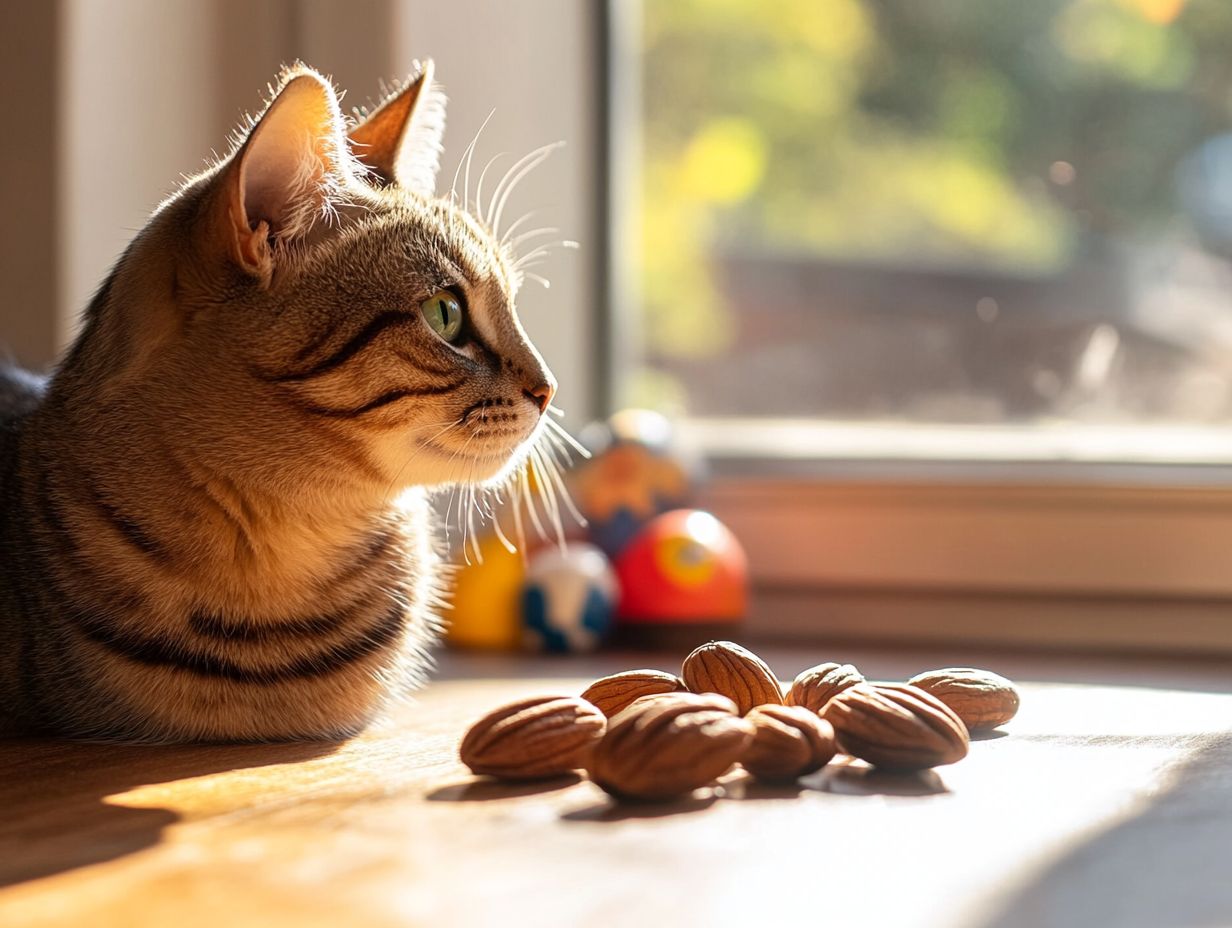Understanding the Safety of Pecans for Your Cat
Are pecans safe for cats? This is a common question among cat owners concerned about their pets’ health. While pecans may be a popular nut for humans, understanding their effects on feline friends is crucial.
This article explores the potential risks and benefits of feeding pecans to cats, helping you understand the nutritional value they offer versus the health concerns they may pose, including the presence of juglone and aflatoxins.
We will also suggest some tasty alternatives like pumpkin seeds and sunflower seeds to keep your kitty happy and healthy.
Ready to find out more?
Key Takeaways:

- Avoid feeding pecans to cats due to potential health risks like gastrointestinal upset and pancreatitis.
- Recognize that pecans can lead to choking hazards, intestinal blockages, vomiting, or lethargy.
- Choose safer treats such as cooked lean meats or small amounts of cooked vegetables for your cat.
The Role of Diet in a Cat’s Health
The significance of diet in a cat’s health lies in its profound impact on their overall well-being, energy levels, and behavior. A proper diet is essential for maintaining a healthy body weight and preventing obesity, as well as promoting optimal digestive health.
A balanced diet that includes all essential nutrients—such as proteins, fats, vitamins, and minerals—plays a crucial role in ensuring a cat’s longevity and vitality. It’s vital for pet owners to understand the importance of diet in their cat’s health to help them lead healthy, happy lives free from illness.
High-quality nutrition bolsters a healthy immune system and helps prevent health issues like dental disease and urinary tract problems. Essential fatty acids contribute to a lustrous coat and healthy skin, while specific proteins are crucial for muscle maintenance and energy.
Some examples of high-quality cat foods include those that contain chicken, turkey, fish, and specific ingredients like sweet potatoes and peas. Portion recommendations can vary, so it’s best to consult with your veterinarian for personalized advice.
Discussing with a veterinarian about the most appropriate pet products for a cat’s age, weight, and health is important. By ensuring a balanced diet and adhering to veterinary advice, pet owners can help reduce digestive problems that may hinder their pets’ emotional and physical well-being.
Safe Alternatives to Pecans
Before delving into the risks associated with pecans, consider some safe alternatives that can keep your cat happy:
- Pumpkin seeds
- Sunflower seeds
- Cooked lean meats like chicken or turkey
- Small amounts of cooked vegetables
Can Cats Eat Pecans?
The question of whether cats can eat pecans is becoming increasingly common, as certain nuts pose significant health risks. While pecans are not as widely recognized for their toxicity as other nuts, they contain the compound juglone and can be susceptible to hazardous aflatoxin contamination, making them a potential danger in a cat’s diet.
Veterinary professionals emphasize that even small amounts of pecans can lead to health complications, including gastrointestinal upset and potentially neurological symptoms. Juglone is known to be toxic to many animals, while aflatoxins can cause liver damage and other serious health issues in pets.
Given these concerns, pet owners should be cautious about introducing pecans into their cats’ diets and should instead consider alternative treats that are known to be safe and beneficial for feline health.
Answering the Question
Understanding the nutritional makeup of pecans and their potential toxic effects is essential for cat owners. While pecans contain beneficial nutrients, their harmful components should be carefully considered when determining your cat’s diet.
The high fat content in pecans could lead to obesity or pancreatitis if consumed in excessive amounts. Cats are obligate carnivores, meaning they primarily require meat in their diet for proper nutrition. Certain compounds found in pecans may be toxic, potentially causing symptoms that range from vomiting to more severe issues like lethargy.
Conclusion
In summary, it’s best to avoid feeding pecans to cats due to the potential health risks involved. Instead, consider safe alternatives that can provide your cat with the necessary nutrients. Always consult your veterinarian for personalized dietary advice to promote your cat’s health.
While cats may be curious about various human foods, it is crucial for cat owners to understand that pecans can be harmful to cats. Providing treats that are safe and beneficial for their health is essential. When selecting snacks, owners should prioritize high-quality protein sources and consult a veterinarian about their pets’ unique dietary and nutritional needs.
Potential Risks of Feeding Pecans to Cats

Pecans can be harmful to cats due to potential toxicity from substances such as juglone and aflatoxins. Symptoms of pecan consumption may include:
- Mild digestive issues like vomiting and abdominal pain
- Severe lethargy
- Potential seizures over time
If any negative symptoms, such as appetite changes or abdominal pain, are observed, it is crucial to contact your vet immediately, as these signs may indicate underlying health issues. For more information on food safety for cats, check out this article: Can Cats Eat Pecans? Safe or Harmful for Cats?
It is important for pet owners to monitor their cats for unusual symptoms following dietary changes, particularly when introducing human foods not specifically formulated for feline consumption. Symptoms such as shaking, shortness of breath, or a racing heart should be treated seriously, and veterinarians play a vital role in accurately diagnosing and addressing any health issues that arise, ensuring that cats remain healthy and well.
Health Concerns and Dangers
Feeding pecans raises health concerns that can lead to serious health issues. Short-term symptoms may include digestive problems like vomiting and abdominal pain. Long-term, these issues may escalate to lethargy or seizures, which can pose significant threats to a cat’s well-being.
Benefits of Pecans for Cats
Despite the significant dangers associated with feeding pecans to cats, it is important to discuss their potential nutritional benefits. Pecans are rich in healthy nutrients, including essential fatty acids, which can provide energy and promote overall health when consumed in moderation.
Nutritional Value and Potential Benefits
The nutritional value of pecans offers insight into their benefits for cats, as they contain healthy fats, vitamins, and minerals that can support overall health. However, due to their high-fat content, pecans should be treated as an occasional treat rather than a regular part of a cat’s diet. If a cat does consume pecans, monitor them for symptoms and consult a vet for advice on portion control.
Specifically, pecans are rich in antioxidants, vitamin E, and essential fatty acids, which can contribute to a shiny coat and healthy skin. Additionally, magnesium and zinc support immune health, while fiber aids in digestion, making pecans an appealing option for occasional snacking. However, overindulgence can lead to obesity and pancreatitis due to their high-calorie density.
Alternatives to Pecans for Cats

Safe and healthy alternatives to pecans for cats include various other nuts and seeds that can meet a cat’s dietary needs without the associated risks. Options such as Brazil nuts, sunflower seeds, and pumpkin seeds are excellent choices that offer essential nutrients while prioritizing your cat’s health and safety.
Other Safe and Healthy Treat Options
Numerous safe and healthy treat options are available for cats that provide similar nutritional benefits without the risks associated with pecans. For instance, chicken treats are high in protein and safe for cats, while sunflower seeds contain vitamin E, supporting healthy skin and fur. Pumpkin seeds can also promote urinary health.
These treats enhance flavor and supply valuable vitamins and minerals, making them a suitable alternative. Remember, while some nut-based treats may seem appealing, they are often not worth the risk for cat health.
Many pet owners wonder, “Can cats eat pecans?” While the answer is yes, it’s essential to understand the safety, risks, and feeding guidelines associated with this nut. In small amounts, pecans might not be toxic, but their high-fat content can lead to health issues. Always consult your veterinarian for personalized dietary advice to ensure your cat’s nutrition is balanced and safe.
Additionally, small portions of cooked chicken or fish provide protein and omega fatty acids, which are essential for a cat’s growth and energy. Consulting your veterinarian ensures that your cat receives not only tasty but also nutritionally balanced treats that meet their specific health needs.
This video provides additional insights into pet care and monitoring.
Feeding Pecans to Cats: What You Need to Know
Benefits of Pecans for Cats
- Source of healthy fats in small quantities.
- May offer some antioxidants.
Can cats eat pecans?
Yes, cats can eat pecans but only in small quantities and as an occasional treat. Pecans are not a part of a cat’s natural diet and should not be a regular part of their meals.
Are pecans safe for cats to eat?

In general, pecans are not harmful to cats if consumed in small amounts. However, they can cause digestive issues and should not be a staple food in a cat’s diet.
What are the potential risks of cats eating pecans?
- High fat content can cause digestive upset, such as vomiting or diarrhea.
- Choking hazard if not chewed properly.
- Potential for pancreatitis and abdominal pain due to high fat content.
- Aflatoxin poisoning may lead to severe liver damage.
How many pecans can a cat eat, and what are the feeding guidelines?
A cat should only eat a small amount of pecans, limited to about 1/4 to 1/2 of a pecan as an occasional treat. Overfeeding pecans can lead to digestive issues and other health risks. Always exercise caution when introducing new foods to your pet’s diet.
Can cats with allergies eat pecans, and what are the risks?
Cats with known allergies to nuts should not be fed pecans. Some cats may have allergic reactions that could be severe. If you are unsure if your cat has any allergies, it is best to consult with a veterinarian before giving them any new food. It’s crucial to monitor for any signs of allergy and act quickly if symptoms appear.
What should I do if my cat eats too many pecans? What are the emergency care steps?
If your cat accidentally eats a large amount of pecans, monitor them closely for any signs of discomfort or digestive upset, such as:
- Lethargy
- Vomiting
- Changes in appetite
- Behavioral changes
If you are concerned, contact your veterinarian for further advice. In case of severe symptoms, seek emergency veterinary care immediately. Having pet insurance can be beneficial for unexpected health issues.